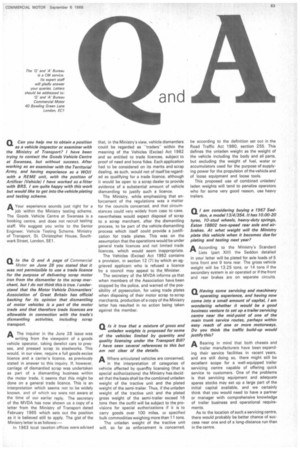Q In the Q and A page of Commercial Motor on
Page 89

If you've noticed an error in this article please click here to report it so we can fix it.
June 28 you stated that it was not permissible to use a trade licence for the purpose of delivering scrap motor iron from the dismantler to the scrap merchant, but I do not think this is true. I understand that the Motor Vehicle Dismantlers' Association of Great Britain has official backing for its opinion that dismantling of motor vehicles is a part of the motor trade and that therefore trade licences are allowable in connection with the trade's dismantling activities, including scrap transport.
AThe inquirer in the June 28 issue was writing from the viewpoint of a goods vehicle operator, taking derelict cars to presses. and pressed scrap to steelworks. This would, in our view, require a full goods excise licence and a carrier's licence, as previously stated in answer to this inquiry. If. however, carriage of dismantled scrap was undertaken as part of a dismantling business within the motor trade, it seems that this might be done on a general trade licence. This is an interpretation which seems not to be widely known, and of which we were not aware at the time of our earlier reply. The secretary of the MVDA has now shown us a copy of a letter from the Ministry of Transport dated February 1966 which sets out the position as it is believed still to apply. The gist of the Ministry letter is as follows:—
In 1963 local taxation offices were advised
that, in the Ministry's view, vehicle dismantlers could be regarded as "traderswithin the meaning of the Vehicles (Excise) Act 1962 and so entitled to trade licences, subject to proof of need and bona fides. Each application had to be considered on its merits and scrap dealing, as such, would not of itself be regarded as qualifying for a trade licence, although it would be open to a scrap dealer to provide evidence of a substantial amount of vehicle dismantling to justify such a licence.
The Ministry, while emphasizing that enforcement of the regulations was a matter for the councils concerned, and that circumstances could very widely from case to case. nevertheless would expect disposal of scrap to a scrap merchant, after the dismantling process, to be part of the vehicle dismantling process which itself could provide a justification for trade plates. This was on the assumption that the operations would be under general trade licences and not limited trade licences, which would seem inappropriate.
The Vehicles (Excise) Act 1962 contains a provision, in section 12 (7) by which an aggrieved applicant who is refused a licence by a council may appeal to the Minister.
The secretary of the MVDA informs us that when members of the Association have been stopped by the police, and warned of the possibility of prpsecution, for using trade plates when disposing of their motor scrap to scrap merchants, production of a copy of the Ministry letter has resulted in no action being taken against the member.










































































































































